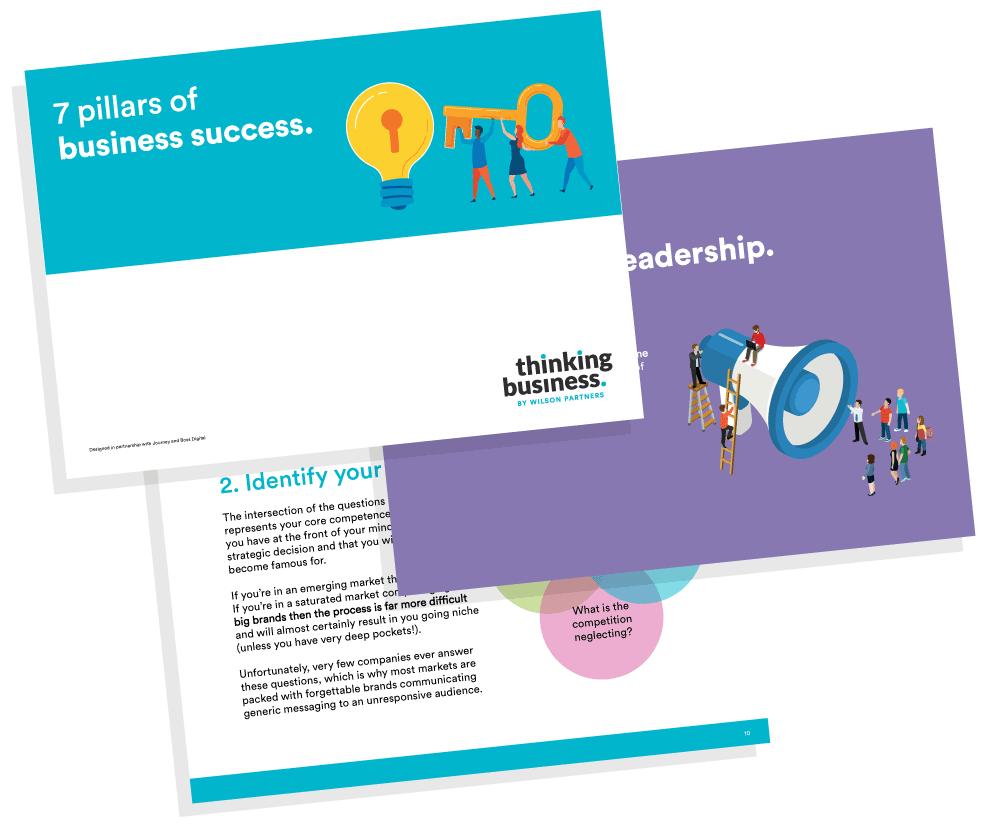
7 pillars of success part 6 – Finance and Legal, interview with Duncan Bye
For part 6 of our ‘7 pillars of success’ series, we’re talking to our very own Duncan Bye. ‘Dunc’ is an associate director at Wilson Partners and in his words ‘has been part of this fantastic team since 2011’. He works with a number of our key clients, working on strategy, profit extraction, and succession planning with a clear focus on strategy and cashflow management in recent months! ‘My real passion is working with owner managers in order to build not only a better business, but a better lifestyle! By documenting their goals (business and personal), I’m able to assist with creating an action plan and holding them to account, whilst most importantly, having fun along the way!’ So he knows a thing or two about finance and we thought ‘who better to ask’?
What are the most common mistakes you see companies making with their financial strategies?
Answer:
The first mistake is that a lot of companies don’t have a financial strategy! It’s so important for business owners to ask themselves why they set up the company in the first place, where they want the business to go and how they’re going to make that happen, yet so often this doesn’t exist.
The second most common mistake is a lack of regular management reporting. A lot of businesses, even up to a significant size, will have no idea what their finances look like. A big misconception is that if you’ve got cash in the bank then you’re okay – but it doesn’t necessarily mean that at all. Especially for businesses running on a cash basis, it’s impossible to tell what your reserves and profits are if your financials aren’t up to date.
The third most common mistake is little to no forward planning. COVID-19 has been extremely eye opening for business owners. Understanding what liabilities are building up throughout the year and where they might be in the next 9-12 months is absolutely crucial. Corporation tax, for example, catches a lot of businesses out: if money hasn’t been ring-fenced then gathering the cash when payment day arrives can be a huge issue..
There is a temptation during times like these to secure cheap debt. What are some of the things a business should consider before making that decision?
Answer:
It’s a really relevant question. The most important things to ask yourself are:
- Why are you taking it?
- What will it be spent on?
- What is the real cost of the debt?
The answer to the first question will give you a good understanding of whether you really need it: Has there been an unforeseen event? Are you expanding? Will it facilitate certain investments that make you more profitable in the long term?
And what specifically will the money be spent on? Is it likely to be payroll? Equipment? HMRC debt? Identifying what you’ll actually be spending the money on will ensure you don’t end up borrowing more than you really need.
Finally, let’s be clear, free debt doesn’t exist, certainly not long term. Some debt products, specifically the recent CBILS or Bounce Back loans backed by the Government are in fact 0% interest, albeit only for the first 12 months. After this period, depending on the lender and their risk profile, the interest rate can jump significantly. Another thing to look out for is the early repayment charges. These are often hidden in the small print and can be extremely expensive, leading to poor business decisions in the longer term and an expensive way of funding projects. This could impact on not only the business’s margin, but more importantly the ability to continue to invest money in key areas such as staff development, technology and delivery.
The key here is to be aware of the terms of the borrowing to understand the real cost of the debt.
What would you say are the top three credit control measures for securing cash flow?
Answer:
Being completely transparent with your clients about payment terms and what’s expected from the get go can be one of the most effective ways of managing cash flow. Even better, businesses who charge monthly should set clients up on direct debit. It means less work chasing debt and is a good indication as to whether your objectives are aligned with theirs: if a prospective client doesn’t want to be set up on direct debit, they’re basically telling you that they’re not willing to pay your invoices within the agreed terms.
The second is something everyone can be guilty of, and that’s getting invoices out when work has been done – or ideally before! Lagging invoices can be really disruptive to cash flow. Depending on your client’s invoice run, sending invoices mid-month as opposed to the end could be the difference between collecting cash within 15 days or having to wait months. Monitoring the number of bad debts and credit notes will also give you a good indication of operational services or product quality of the client that may impact cash collection.
Lastly, ensuring that you are aware of outstanding invoices and that there is a process to recover them. It’s so easy to raise an invoice and assume someone else is going to chase it, so a conversation should be had about roles as individuals, as managers, as directors etc, to ensure that someone is accountable for staying on top of those debts. Without a debt recovery process, unpaid invoices can be missed and fall deeper into the overdue column which causes two problems: one is the additional work involved, and two is not recognising that customers may be experiencing financial stress. Identifying this early on, reaching out and establishing a payment plan could result in collection of the debt in full before the situation gets out of hand.
In all instances there are software solutions that can be implemented to assist with debt collection and streamline/automate some of these processes, making it easier than ever to secure and maintain cash flow.
What are the top three financial metrics you recommend companies track, and how frequently should they do so?
Answer:
Revenue would absolutely be number one: where is it against goals and expectations? Is there a trend? Is it increasing or decreasing? Is it sustainable? But tracking revenue as a KPI doesn’t mean anything if you look at one month in isolation. It’s about looking at the big picture and understanding a comparable data set, not just seeing a number on a page. I’d be looking at that every month, if not more frequently.
Secondly would be gross profit, which is often underestimated, particularly in service businesses. Having a gross profit target and understanding what it means for your business is really key to ensure you’re financially resilient.
And finally, tracking net profit so that you understand exactly what you have available for extraction or reinvestment.
I would caveat this all by saying the one crucial thing to understand is your cash. “Cash is king”! You could be making all the profit in the world, but if you aren’t on top of collecting money from clients and financing it properly, you’ll struggle. Any and all businesses should be tracking these things.
Tech startups are increasingly using non-financial metrics as key performance indicators. As an accountant, what are your feelings on that approach?
Answer:
I’ve seen it be extremely effective in encouraging teams to work in a certain way, whether that’s a focus on client retention or customer satisfaction. It depends on the sector you’re in, but ultimately if customers are happy they tend to buy more and refer more, so I do see the value.
Does this kind of non-financial metric replace all the traditional KPI’s? Absolutely not. Someone still needs a tight grip on all financials or you may not have a business to monitor for very long!
Ultimately, the two things aren’t mutually exclusive. From my experience the most progressive and switched-on organisations take both equally seriously.
Increasingly companies, particularly start-ups, are applying the Silicon Valley philosophy of optimising for growth rather than profit extraction, even in very traditional sectors, in the hope that if they can capture enough of the market, they can then achieve profitability via new forms of monetisation and various economies of scale. Is this way of thinking something you encourage?
Answer:
If you’re extracting profits at an aggressive rate then you are forgoing investment in the business and your position in the market may start to suffer over time. Inflation alone will erode away at the value and profitability of the business, so a minimum of a 3-5% growth year on year is essential just to stand still.
But growth for growth’s sake can also be a dangerous place to be. If you grow the topline significantly but fail to maintain profitability or deplete your cash reserves, then you’re building on extremely fragile foundations. It’s so important to have a plan around how you’re going to finance the growth and the timescales involved.
It’s going to sound like I’m sitting on the fence but I do genuinely believe it’s down to the business’s growth ambition and appetite for risk.
As we’ve touched upon previously, COVID-19 has delivered a tough lesson for many business owners. What would you say are the most important legal documents for business owners to have in place to protect themselves, their businesses and their employees?
A Contract of Employment that is kept up to date for every single employee is so important. Legislation is changing all the time and businesses must keep on top of these changes. Since the Coronavirus Job Retention Scheme came into effect, we’ve seen a lot of clients worry about whether their employees’ contracts enable them to place their employees on furlough, and in these instances it’s crucial to have that document to refer back to. Whatever scenario happens in the future, employees and the business are protected, everyone knows where they stand and the information is black and white.
Contracts with your clients are equally important. We discussed earlier the importance of communicating expectations and payment terms, but what happens if they don’t sign the Terms of Agreement? Are you still engaged to do that work? A written contract expanding on these points will further protect the business should there be any issues around receiving payment from clients. Unfortunately, a cheap online engagement letter replica isn’t sufficient, and while it’s not up to us as accountants to give legal advice, we do regularly point our clients towards appropriate legal guidance so that we know they have all the fundamentals in place.
An oftentimes overlooked but crucial document is a Shareholders Agreement. In an ideal world you’d never need to use it and everything would be done amicably and above board, but this isn’t an ideal world. Shareholder Agreements provide clarity and protect both the companies and individuals concerned.
And finally, expanding on the previous point, a business owner should ensure that they have the correct transactional documents when shares are transferred or a transaction has taken place in the business. It can be innocent naivety, but some business owners will go online and search “How do I transfer shares?” They find a one page document online to sign and that’s that. But it’s very likely that this document hasn’t covered off all of the potential issues that can surround these transactions. When business is booming and now worth £10mil, you’re going to want to be sure that the previously exited shareholder of 50% signed the appropriate documentation!
Event
Webinar – Changes to the UK Trust Registration Service, May ’22
A short webinar and Q&A session with our Trust specialists Jodie Green and Sara Pedrotti. You can view the video and download the presentation here.

Download our free guide to the 7 pillars of business success
Read our free guide what you need to focus on to help you make better decisions and achieve your goals quicker.
Please complete our form to download the guide.
Sign up to receive alerts
Call us on 01628 770 770 for a no-obligation chat
You may also be interested in...
Seeking investment: Getting your business fit for investment
Get your house in order before seeking finance, and you may not need it! Before looking for capital from external sources, it is paramount to ensure…
Meet the team in 90 seconds – Tom Bradbury
Introduce yourself Hi, I'm Tom and I am a Director in the Corporate Finance Team here at Wilson Partners. I started my career and did my training…
Inheritance Tax: Let’s get organised
Let’s face it, none of us want to think about when we’re going to die, let alone talk about it, or consider if there’s going to be a tax bill waiting…




